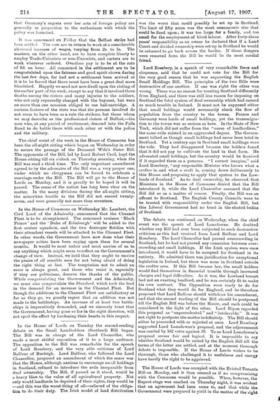The debate was continued on Wednesday, when the chief event
was the speech of Lord Lansdowne. He doubted. whether any Bill had ever been subjected to such destructive criticism as this had received from Lord Balfour and Lord. Rosebery. The Lord Chancellor had proved overcrowding in Scotland, but he had not proved any connexion between over, crowding and small holdings. If the Irish system were once introduced, it would have to be accepted for Scotland in its entirety. He admitted there was justification for exceptional legislation in Ireland, but there was none in Scotland outside the crofter area. If this Bill became law,. the small holders would find themselves in financial trouble through increased charges and legal difficulties. As it was, the Lowland tenant bad not an exacting landlord, and he was certainly fit to make his own contract. The Opposition were ready to do for Scotland what they would do for England, and he therefore proposed that Lord Balfour should withdraw his amendment; and that the second reading of the Bill should be postponed till the English Bill was before the House, and each could be considered in the light of the other. Lord Ripon regarded this proposal as " unprecedented " and "intolerable." It was not right to postpone the matter indefinitely. The Bill should either be proceeded with or rejected at once. Lord Rosebery supported Lord Lansdowne's proposal, and the adjournment was carried by 162 votes against 39. To us Lord La,nsdowne's proposal seems fair and logical. It is impossible to say whether Scotland would be suited by the English Bill till the terms of the latter are settled, and at the moment thorough debate is impossible. If the House of Lords wishes to be thorough, those who challenged it to usefulness and energy have hardly the right to be aggrieved.


































 Previous page
Previous page